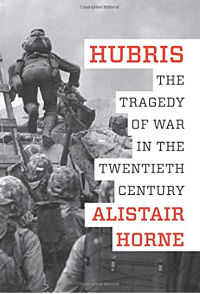Hubris: The tragedy of war in the Twentieth Century. (2015)

“…a reflection on military hubris and the part it played in 20th-century conflicts.
Sir Alistair Horne, journalist, biographer and historian
Publisher: Weidenfeld & Nicolson
“…Sir Alistair’s subject is the embedded tendency of generals and nationalistic political leaders who experience military triumph to overreach, and for the next generation to inherit their arrogance and complacency with disastrous results.
“The author … confines himself to six battles that spanned the first half of the 20th century…
“They include the smashing of the Russian fleet by the Japanese at Tsushima in 1905; the little-known battle of Nomonhan in 1939 when General Georgy Zhukov, the most successful commander of the second world war, destroyed the Kwantung Army and put paid to any further thought of Japanese northward expansion; the Japanese defeat at Midway just six months after the reckless gamble of their attack on Pearl Harbour; and the defeat of the once-preening Wehrmacht outside Moscow in 1941, which Sir Alistair sees, even more than the later battle of Stalingrad, as the “end of the beginning” of the war.
“This melancholy account of military delusion closes with two conflicts that had huge consequences. The first is General Douglas MacArthur’s vainglorious dash across the 38th Parallel to the Yalu river in 1950, which brought China into the Korean war with calamitous results. And the second, four years later, is the fall of Dien Bien Phu (where the French had convinced themselves they were reliving the glorious defence of Verdun in 1916) to General Vo Nguyen Giap’s Viet Minh, which would later drag America into the Vietnam war.”
From the review ‘Military hubris: Their own worst enemy’, The Economist print edition, 7 November 2015
Buy the book here: Hubris: The tragedy of war






Leave a comment
Back to the top